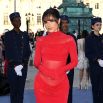"I understand why people say Korean, Chinese, Japanese...they all look the same," said Alisha Budhrani, a member of the "pan-Asian" girl group Blush. "Even me, as an Indian girl growing up in Hong Kong, I was never sure how to distinguish differences properly."
Budhrani tried to cut America and Western nations some slack for the uncomfortable ease with which they lump Asia into one monochromatic nation state. Mo Yan and Haruki Murakami become novelists that feature Asian plots in Asian settings, and nothing more. Akira Kurosawa and Karwai Wong, merely Asian filmmakers. Chinary Ung and Isang Yun, both Asian composers. One and the same.
Western generalizations have been kinder to India, but Budhrani still carries a beef for cultural ignorance.
"When I tell people we're a pan-Asian girl group and I'm from India, they always say 'India's not part of Asia," she said, audibly rolling her eyes.
Budhrani's Blush cohorts—Victoria Chan (Hong Kong), Natsuko "Nacho" Danjo (Japan), Angeli Flores (Philippines) and Ji Have Lee (South Korea)—exemplify individuality, and not just on the ethnic level. FarWest Entertainment scouted for dancing and vocal talent among thousands of Asian girls during its televised Project Lotus, but strong personalities drew equal attention. Western audiences struggle enough to differentiate between American pop groups. FarWest knew a girl group consisting of five Asian semi-clones would only amplify the problem. Jon Niermann, manager for FarWest, listed the Spice Girls as the ideal.
"To me, not since the Spice Girls has there been a group where each member is so unique and memorable," he said. "You can remember Posh, Sporty, Baby, Scary and Ginger. They each had a persona."
If a female pop group is going to break through to the American audience, strong personality will certainly be required as the girl group field has suffered from drought as of late. The Pussycat Dolls and Danity Kane exemplified the immemorable supporting cast method and have been forgotten accordingly. Prospects for a Destiny's Child reunion bring goosebumps to fans, but Beyoncé seems satisfied being the biggest female performer in the world on her own.
Foreign girl and boy bands have crashed American shores however. One Direction owes its success to song and dance of course, but the British element shouldn't be overlooked. Fans embrace the group as a whole but dedicate themselves to individual members, either based on personality or attractiveness. One Direction member Zayn Malik is engaged to Perrie Edwards, a member of British girl group Little Mix. That act's album Salute debuted at no. 6 on the Billboard 200, without releasing one single. Billboard traced the success back to One Direction and indicated the group may have stirred the American audience's musical appetite for foreign food.
The trend has only reflected Brits thus far, but Niermann sensed the Asian potential years ago.
He underwent the educational education process when he spent 15 years overseas, working for Disney and Electronic Arts in Asia. He spent time as president of Disney's International Asia-Pacific division and the depth of talent fascinated him.
"At that point we were exposed to a tremendous amount of Asian talent," he recalled. "The deeper I looked into it, it was clear that very little Asian talent or content had spread West."
Niermann was no dummy. He saw the cultural benefits in spreading Asian talent to the world, but he didn't miss the potential for profit either. India, Japan, South Korea and especially China have rapidly fortified their economic power, and their diplomatic sway has strengthened accordingly. Niermann reckoned the entertainment industry would soon reflect the changes as well. He and his associates founded FarWest to beat demand to the punch.
He didn't originate the idea of the Asia-to-America pop star, but previous implementers struggled. The relative success of Asian pop stars in the United States—compared to their home nations—discourages attempts at crossover. Niermann noted that the problem didn't work in reverse: American acts sell just as well in foreign markets when promoted. Asian labels tend to focus promotion for groups to specific markets however, and then those groups struggle to find acceptance among foreign audiences. FarWest aims to nurture Blush in the U.S. before heading abroad. Blush doesn't have one obvious Asian market, after all.
"In the beginning, people would freak out on us and said 'go back to Asia and be big in Asia,'" recalled Chan, casually glossing over casual racism while outlining the group's experiences in America. "People, especially in Asia, see us as an international entity. K-pop will never take us in. J-pop won't take us in."
Blush has opted to subtly infiltrate American airwaves with singles that don't neccesarily suggest an international pop music revolution. "Ain't Nobody Got Time For That" features partying, luxury branding and twerking; a tale almost as American as the linguistics of the song's title. "Warrior" fills the spot for an anthemic ballad (one produced by Quincy Jones, no less) present on every pop album.
Subtlety only goes so far however. The group's backgrounds come out as they will. Nacho, Blush's Japanese member, stands out from her cohorts during a recent showcase in New York City. Her enfant-sauvage hairstyle draws the eyes (and stares) of the music industry reps in attendance. She wears her hair as a tall, long silver mohawk, emulating J-pop and K-pop stars abroad that have popularized the coiffure (including potential crossover star G-Dragon). The most foreign-looking member is potentially the most American as well: Nacho described the group's upcoming SXSW stop as "super dope."
The Asian aspect has made understated appearances in recordings however. "Undivided"—Blush's 2011 single featuring Snoop Dogg—closes with each member singing the line "everyone needs to find their someone" in her respective native language. "Sweetly Leave Me" more directly incorporates the music and choreography of Budhrani's Indian background. Management and performers alike understand that forcing the Asian card could amount to kitsch however.
"We don't want to overdo it to the point that it looks inauthentic," Budhrani explains. "Ke$ha is Ke$ha. She has her own way of singing, of talking. We have our own way of singing and talking too. We just need to do what's natural."
"What's natural" was a popular theme for Blush. Music Times spoke with every member (except Lee) and each discussed creating better pop music, not better Asian pop music. They dwelt on the universality of music, versus the individuality of their cultures' music. Perhaps media and promoters alike emphasize the ethnicity of Blush too much, rather than the product it creates. Blush features five members representing five nations, and they speak at least ten unique languages between them. They share fluency in only one however: English.
The best classification might come from Grand Funk Railroad: Blush is an American band.
© 2025 MusicTimes.com All rights reserved. Do not reproduce without permission.




